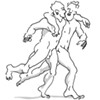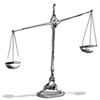[image-1]
If you dare to watch the news, you may get the idea that civilization is unraveling, or at best, that the political situation of the United States is so mired in its own insanity that it's never going to get out of the swamp.
We are watching, silently for the most part, while every major problem that affects the world is being ignored. We are watching while war and epidemics spiral out of control—and yet while everything else is being made into an issue.
All aspects of life—success, failure, education or the lack of it, poverty, wealth, gender, economics, one's skin color, the food we eat, one's internal organs (especially if female), the heat that prevents you from freezing in the winter, all communications from the most private to the most public, the meekest personal choice and even the subtlest emotion— are all subject to being politicized.
That is a weird word, and a stranger concept. In our time of history, when it seems the destiny of humanity and every other species is being gambled, we are all standing at the intersection of the personal and the political. Every last thing we desire, need, think, or do can be turned into a political commodity, processed by spin doctors, spliced into a 30-second ad, and force-fed back to us with an emotional charge designed to manipulate—that is, politicized.
Our political systems, that is, the structures that supposedly run society, are nakedly answerable to nothing but the power of money. We all watch as the opinions and the wellbeing of ordinary people are ignored. We are told there are issues, but nearly all the time, ideology is merely packaging designed to motivate political contributions. Congressional representatives, who must seek reelection every two years, spend their entire terms fundraising for the next election.
When I look at many politicians, I see a strange sickness emanating from them. It is imprinted on their faces, in their body language, in their voices, and in what passes for reason. The parade looks like a pageant for who should get their photo in the dictionary next to the term "narcissistic wounding." I look at many of them and wonder how anyone, anyone at all, could take them seriously; could trust them with anything, much less the fate of society.
Politics is deceptive, and for at least as long as we know, it always has been. Of the people I know who are involved in politics, I expect most of them to lie to me. I have for many years had friends in politics, and as time has gone on, I have noticed that fewer and fewer of them reveal any capacity for truth—by which I mean their words and their actions being in alignment. It's not enough to be personable or charming to seem real. The bottom line is that metric between words and actions.
When I was in my 20s, I got out of political campaign writing, something I was passionate about, because I figured out that in order to do that particular job, I would need to lie to the public on a routine basis. I have done so personally. I have said things to public bodies, been quoted in newspapers, and made written statements that were untrue based on my understanding that it's simply how the game is played.
For example, in politics one never reveals a candidate's true position if it's going to cost the candidate votes. One never gives their opponent an edge like that. If there is a campaign spending limit, and the limit prevented a real campaign, I would break the rules and do it in as untraceable a way as I could, and make sure the supporting documents looked good.
I was always sure to lie for the "right" cause and on behalf of the "right" people, people I sincerely supported and had personally vetted, though it was deception nonetheless. Not wanting to play that game— indeed, being disgusted by that game— I got out, and pursued being an investigative reporter, where verifiable truth is the only commodity.
Deception is the very feedstock of politics, as the game is currently played, and as it's been played for a long time. One must actually do it personally to understand this fact in a meaningful way, and even then, few will ever admit it. Once you've been involved, then it's possible to look at any person in a position of power making a statement and know that the statement is either an outright lie or conceals some deeper truth.
I think that on some level, most people understand this intuitively, though there's another problem. Many who are eager supporters of one side or another, or who have dedicated their lives to an issue, are happy to have their self-deceptions affirmed by the glamour and supposed glory of the political ritual. In politics, once you win, it no longer matters how you got there—at least not to the winner. It does not matter if there is collateral damage. This is especially true when a political position hurts others or deprives them of their rights. When you look at the political game, at the orgy of fear and manipulation, and think it's in some way normal, you have been swallowed.
I have also worked for some fantastic candidates who were strong enough that the truth was the thing of value. In those circumstances there was no reason to lie, except for the little part about campaign spending limits, which (where it may have once existed) seems to be a rule made to be broken.
This problem manifests on many other levels, most of them rather sly. The idea that it's okay to lie in order to get your way is a manifestation of politics. A great many people feel that it's okay to lie, as long as they deem it harmless and convenient (for them). In that condition, there is no question of personal integrity, and it's then impossible to hold others to a standard of personal integrity and not be a hypocrite.
This is a reflection of the larger politics that overshadows us, and it's something that feeds and vindicates the conduct of politicians. In other words, those who lie, and lie to themselves as a way of life, are far likelier to accept the fact that their supposed leaders lie as a way of life. To compromise truth means that after a while it becomes impossible to see, and is then perceived as nonexistent. Everything is just another position, just another posture.
Meanwhile, we are confronted by local and global problems that we know are urgent, and at the same time facing political problems that just seem intractable. The system, especially on the federal level, is not broken; it's a rusted-out wreck. It has some of its original shape, it's vaguely recognizable as what it once was—but it sure looks like it ain't goin' nowhere.
• • •
It is into this hot mess that we are called upon to show up for an election and cast a ballot. We are called upon to take politics seriously enough to take time out of work, errands, taking care of the kids, Facebook or whatever, and fill in the little circle. We are called upon to have some integrity and participate in a way that is integral to civic life. We are called upon to do what people have been shot at for demanding the right to do.
We must, by some miracle, pretend that all of this insanity does not exist, and make some rational choices about who will be better. It's not easy, because nearly everything that happens in politics is an invitation to ignore politics, to tune it out, to get distracted, or to do something seemingly more important or more pleasant.
Everything we see in politics offers some evidence that it doesn't really matter, and that the best we get is the lesser of two evils.
It therefore takes extra courage to have the discernment to see that there is one political party that has made it a point to repeatedly shut down the government. There is one political party that blocks nearly every vote in both the Senate and the House of Representatives. It's a party of government officials, paid from the public coffers, who proclaim hatred of the government itself and are willing to damage or destroy it any way they can. There is one political party that does everything—anything and everything—to block participation in elections.
There is one political party whose platform involves being against people having the right to seek health care. There is one party that would block all reproductive rights of women, which lately (and astonishingly) would include blocking access to pregnancy prevention. Both of these are in violation of long-settled constitutional law, and common sense.
There is another political party that has problems of its own. In many ways it is equally sold out, not to Greenpeace but to the same megacorporate interests as their counterparts. They demonstrate that being sold out by refusing to fight; for refusing to stand on any principles whatsoever.
Together, these parties create a system that seems to support the status quo, that suppresses new voices and new ideas, and that makes you wonder who is who.
Meanwhile, the struggle of life has many people feeling exhausted and demoralized. People feeling stripped of not just their humanity but also of their basic energy are not necessarily in a position to participate, or to fight. People who are "entertained to death" may see little reason to get up off the couch, as long as they still have one.
• • •
Despite many appearances, the political system is not as monolithic as it seems. There are many voices, many points of view, and yes, there is a power structure that marginalizes and silences many of them. The other thing to remember is that nothing is as intractable as it seems. Nothing is as permanent. The wheel of progress, or of karma, or of justice, is always turning, no matter how slowly.
While we are alive, there remains a future, and while there are people younger than us, there remains a future worth investing in. Cynicism is not a viable position because on its own, it will produce nothing. Hope is not a viable position, because it does not lead to progress, and it can be as paralyzing as bitterness.
Between these two extreme polarities we have the power to do what we can. My position on voting is that it's vitally important—and not the only important thing. It is, however, a first step. Just showing up to the polls, even if you submit a blank ballot as a protest, is evidence that people on the ground, which holds up the political ladder, are awake and paying attention.
For many years, I was so disgusted that I did not vote. I participated in issues as a journalist, where I had much more influence than a ballot. At some point I changed my mind and made a different decision. It went something like this: I looked at who was benefiting from lack of participation, and I figured out that the other guys were a little better. It was that simple.
I also decided that it would be personally hypocritical to advocate awareness of politics and participation in politics and also set the example of not participating on the most basic level. So, I plan to vote in the November 4 national and local elections. I will need to hold my nose in some races, and I may write in the names of my friends in others. But I will be there.


























